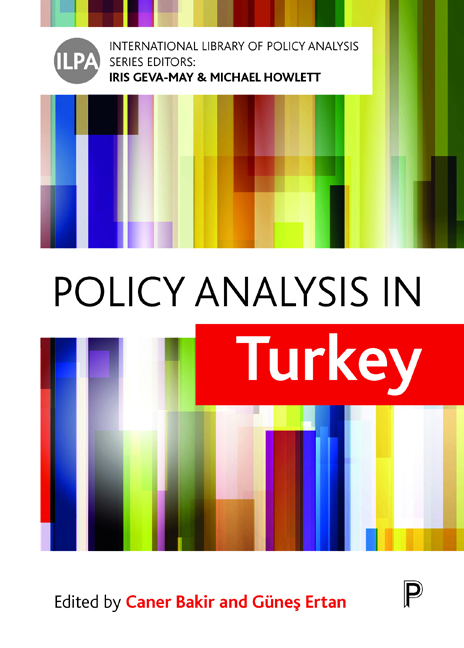Book contents
- Frontmatter
- Contents
- List of tables and figures
- Notes on contributors
- Editors’ introduction to the series
- one Pushing the pendulum from politics to policy: the state of policy analysis in Turkey
- Part One Historical roots, styles and methods of policy analysis in Turkey
- Part Two Policy analysis by governments
- Part Three Experts, international actors and public opinion
- Part Four Parties and civil society-based policy analysis
- Part Five Academic, bureaucratic and advocacy-based policy analysis
- Index
fifteen - Public policy and media in Turkey
Published online by Cambridge University Press: 19 April 2022
- Frontmatter
- Contents
- List of tables and figures
- Notes on contributors
- Editors’ introduction to the series
- one Pushing the pendulum from politics to policy: the state of policy analysis in Turkey
- Part One Historical roots, styles and methods of policy analysis in Turkey
- Part Two Policy analysis by governments
- Part Three Experts, international actors and public opinion
- Part Four Parties and civil society-based policy analysis
- Part Five Academic, bureaucratic and advocacy-based policy analysis
- Index
Summary
Introduction
There is a growing literature on the relationship between mass media and policymaking, and how mass media is crucial in terms of drawing and keeping public attention on policy processes. As Stromberg (2001, p 653) puts it, ‘the logic why mass media should influence policy is simple. If more informed voters receive favourable policies, then mass media should matter because they provide most of the information people use in voting.’ However, if we consider politics beyond a simple voting practice, and rather as an ever-expanding sphere of power relations that involves the direct participation of people in daily issues, the degree that mass media matters should increase. With both online and print media becoming more accessible to everyone and the flow of information growing incrementally, the mediation of information between people and policy-makers is becoming more important. Therefore in this chapter we explore this relationship between media and policy-making in the Turkish case.
Our contribution to the existing literature is twofold. On the one hand, we address the three different roles played by mass media in its relationship to policymaking in Turkey – (1) agenda-setting; (2) framing; and (3) panoptical, and being reflected by public policy – and, based on Pierre Bourdieu's field theory, we point out the way media as a semi-autonomous field can reflect and refract public policy with respect to varying conditions. On the other hand, methodologically, we suggest a template for media content analysis for the Turkish media and its role in policy-making across different Turkish media outlets over 20 years, as a framework for future studies.
We first review the literature explicating the relationship between mass media and policy-making. Then we engage with this literature, complementing it with the ‘field theory’ framework suggested by Bourdieu (Benson, 2006), exploring the Turkish case through this perspective. We then lay out our time series media content analysis methodology as a way to understand the scope of the media coverage of policy processes and the way they are framed across different Turkish media outlets in regards to various policy areas, namely, domestic politics/ideology, economics, internal security and foreign policy. In doing this, we further elaborate different sub-policy areas encompassed by each field such as the executive vs the opposition, corruption, Turkey and its engagement with international organisations and so on.
- Type
- Chapter
- Information
- Policy Analysis in Turkey , pp. 255 - 270Publisher: Bristol University PressPrint publication year: 2018



